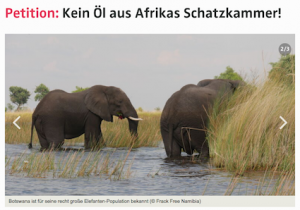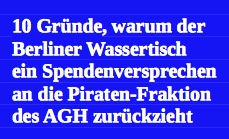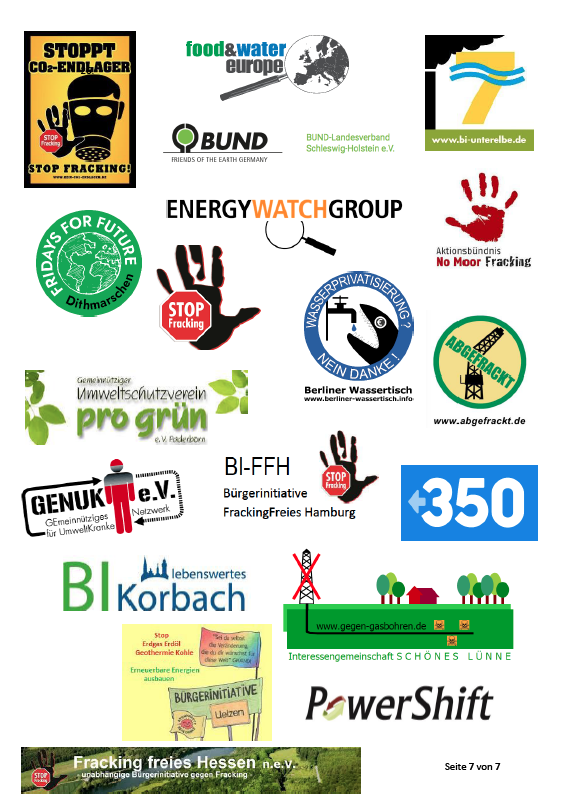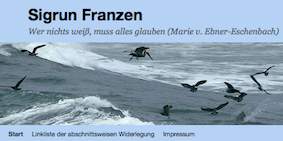Privatsphäre stärkt, Überwachung schwächt! #StopScanningMe


Suche

Schiefergas-Fracking in Deutschland?

#StopEUMercosur Erklärung

Aktion Greenpeace: #StopEUMercosur

#SaveTheOkavangoDelta

Erfolgreich! Über 1 Million Unterschriften „Green Deal“ – Europäische Bürgerinitiative (EBI)

Stop Energiecharta. #NoECT. Wir wollen raus aus dem Anti-Klimaschutz-Vertrag

Europäische Bürgerinitiative gegen biometrische Massenüberwachung (17.2.2021-17.2.2022)

Lebensgefährliche Entwicklung: Gewinnorientierung im Krankenhaus

- Wassertisch-Plenum,
im NewYorck / Bethanien Mariannenplatz 2A
10997 Berlin Openstreetmap fällt coronabedingt aus Überblick (Messstellen: Oberflächengewässer und Grundwasser)


-
Letzte Beiträge
- AöW zum Weltwassertag 2023: Interkommunale Zusammenarbeit noch stärker ermöglichen
- Greenpeace: Fracking – eine unterirdisch schlechte Idee
- Bürgerinitiative gegen CO2-Endlager: Offener Brief an den Bundesminister für Wirtschaft und Klimaschutz Dr. Robert Habeck
- BUND gegen CCS-Endlager
- Jürgen Knirsch: CETA-Handelsabkommen: Eine trügerische Wette auf die Zukunft (Leserbrief an die SZ vom 8.12.2022)
- Neuere Materialien und Dokumente zur CETA-Debatte
- TAZ: Hamburger Abgeordneter über Olympia-Gedankenspiele: „Es kommt zu Vertreibungen“
- NDR: Bewirbt sich Hamburg noch einmal um Olympische Spiele?
- NGO-Bündnis fordert mit gemeinsamen Appell die Senkung des absoluten Ressourcenverbrauchs
- Allianz der öffentlichen Wasserwirtschaft warnt vor CETA: Mit dem jetzigen CETA-Text wird der Schutz der öffentlichen Wasserwirtschaft vor einer Kommerzialisierung weiter geschwächt

Delius-Klage

Keine Steuergelder für LNG-Fracking-Gas Terminals in Deutschland!

RSS-Feeds
Schlagwort-Archive: Council of Nordic Trade Unions
Nordische Gewerkschaften fordern in ihrem TTIP Positionspapier Schutz für grundlegende Arbeitnehmerrechte, öffentliche Dienstleistungen und Demokratie
Council of Nordic Trade Unions (NFS)
26.11.2015
 Nordic Trade Union positions on the negotiations of a Trade and Investment Agreement between the US and the EU. (The Transatlantic Trade and Investment Partnership, TTIP)
Nordic Trade Union positions on the negotiations of a Trade and Investment Agreement between the US and the EU. (The Transatlantic Trade and Investment Partnership, TTIP)
Positionspapier zu den Verhandlungen eines Handels- und Investitionsabkommens zwischen den Vereinigten Staaten und der EU (TTIP)
Introduction
Since the Lisbon Treaty entered into force in 2009, the EU has on behalf of its member states had the competence to negotiate not only trade, but investment agreements as well. The Transatlantic Trade and Investment Partnership (TTIP), which is being negotiated between the EU and the US is one of the first trials of this new competence. It has the ambition to make this the largest bilateral trade and investment agreement in the world.
The TTIP-agreement has the goal of increasing trade between the US and the EU, contributing to increased growth and setting an international standard for extensive bilateral negotiations.
The agreement negotiations were initiated in 2013 and strive to increase regulatory compatibility on a wide front both in the areas of goods and services. The goal was to conclude negotiations in 2015, but at the moment this goal seems improbable due to a prolonged debate about the Investor-State Dispute Settlement (ISDS), among other things. The European Commission has, despite the prolongation of the original schedule, the ambition to finalize negotiations with the Obama administration, that is, before the US presidential election in November 2016. The Nordic countries, which are small, open economies and dependent on international trade are positive to international regulation on trade.
In the Nordic context three of the countries, Denmark, Finland and Sweden are part of the EU and are as such included in the TTIP negotiations, whereas Iceland and Norway are not. The consequences of the agreement will in other words have different bearings on the countries. The three EU members may be assumed to benefit from the agreement whereas consequences for Iceland and Norway are more difficult to predict at this time. However, it is noted that a closer regulatory cooperation between the US and EU will have an impact on the EFTA/EEA states.
zum vollständigen Original-Dokument in englischer Sprache als PDF ![]()

 Pressemitteilungen
Pressemitteilungen








